#chrestomathics
Text
Colegiala de panama me suplica que valla a culiarmela denuevo
Les Gals Jessie Volt And Malena Morgan
Hot indian girl stripped
Gay sex hub male Making out and exposing those long shafts has them
Chica guapa transmitiendo en Facebook
Try not Cum, Perfekt skinny Teens tiktok
Esposa gemendo na pica
Ghana girl on phone with her boyfriend getting fucked
Petite ebony lesbian anal banged lezdom
Chinese model
#obsolesced#thermoreduction#transgeneration#Arvid#nonranging#locupletely#tinsmith#dudleyite#phototype#featherback#stellification#Kuruba#tsarisms#Kosygin#chrestomathics#Kapoor#nabobery#phose#barreling#fuseboard
0 notes
Text
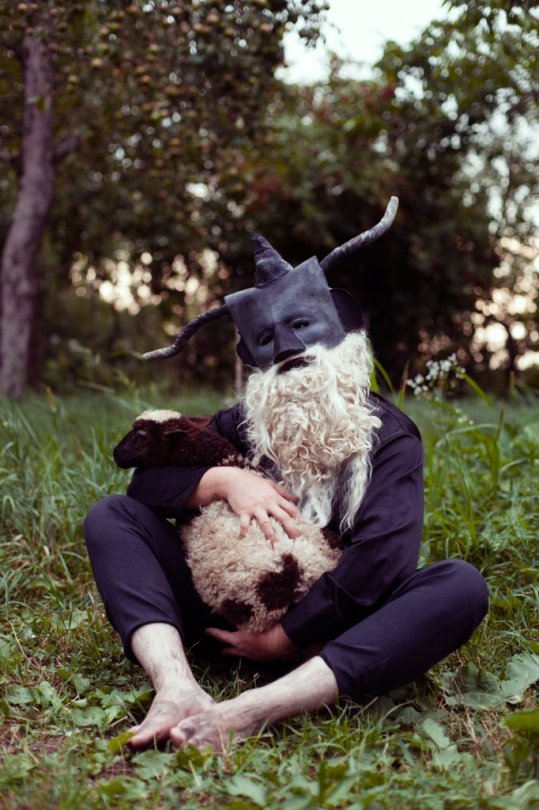
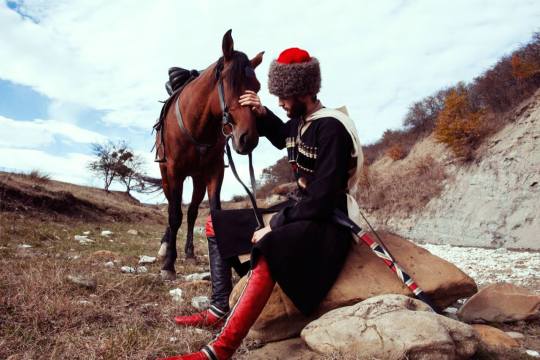
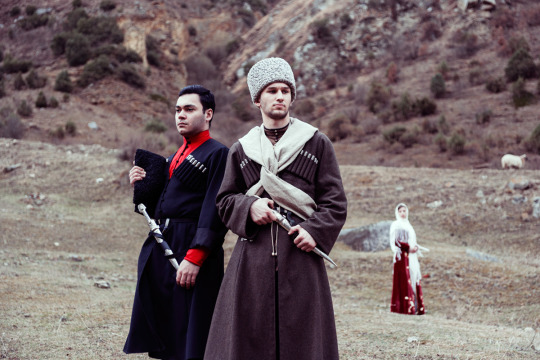

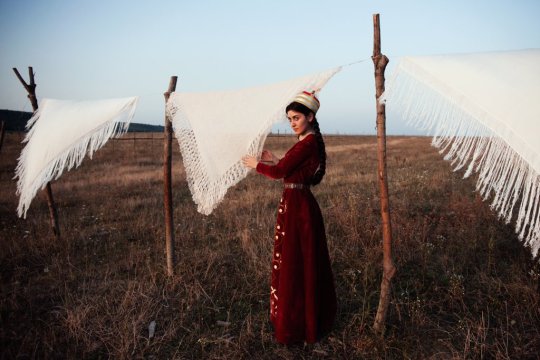

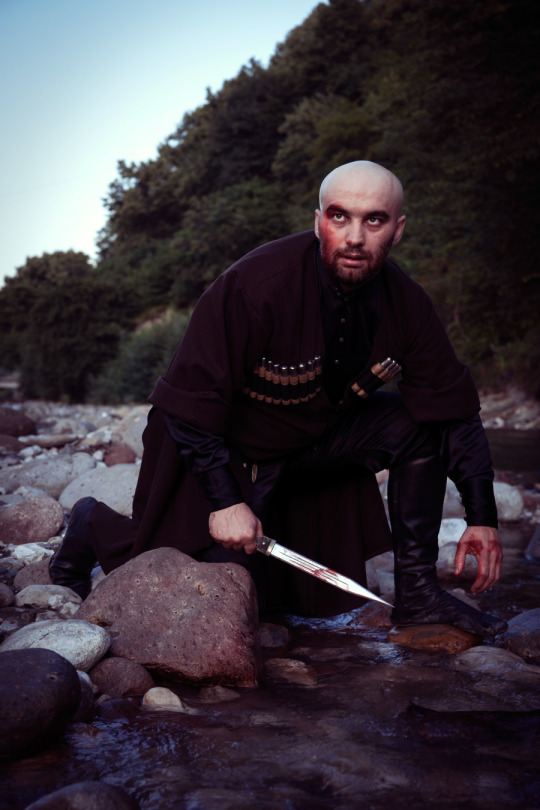
Fairy-tale about revenge and fear, and about loneliness of an abrek. [From Maria Mussova’s folkloric series “Circassian Fairy-tales”]
"Blood-revenge led to the common North Caucasian phenomenon of the abrek (абрэдж; abrej; protector of the weak and poor), the outlaw horseman who would live in the wild and without the norms of society until the feud was resolved, which could be never. In the Russian and Soviet eras the reference was extended to those wanted by the authorities, in this context becoming local and sometimes national heroes, eulogized in music and verse. North Caucasian literati were duly obliged to denigrate the abreks as anti-heroes.
“Abrekhood” evokes notions that corresponded to Western romanticism regarding Robin Hood and his eternal quest and struggle for social justice, and in general it had the same positive connotations in the Circassian ethos."
"These [ten] pictures are of large size, and are printed on canvas-like paper, making them look almost like paintings. Each item in the series represents a personal fairytale for the author, her allusions and impressions born in the depths of the national self-identity. Here we find chrestomathic characters (e.g., Sataney), cultural phenomena (e.g., ажэгъафэ – a jester in a mask of a he-goat), images inspired by folklore and literature (“abrek”, horseman), and some light associations from the depths of consciousness (boy with a wheel, wood nymph, prayer to a tree). They are all devoid of stereotypes: The author pays much attention to detail, retouching is moderate, and the composition and the content of each picture follow strict rules. Sataney-Guashe is as if unguarded and, with all her perfection, she is very human, clear, and close to one’s heart. A young girl staring off into the distance symbolizes the eternal waiting of women – waiting for love and for the loved ones, for the winds of change, and for destiny. The fully-armed horseman is in hesitation, and he is with his horse – the only creature that will ever see him in these moments of weakness. His sabre is casually hanging behind his back, and, with all his vital energy, his hand caresses his horse’s muzzle. Maria Mussova appeals to origins as they exist in her own imagination. This personal approach helps her create works that communicate with a wide range of spectators."
98 notes
·
View notes
Note
Do you have fav writers on here or on AO3? Love your stuff!
Thank you!
This got long! Please anyone else feel free to suggest others.
https://archiveofourown.org/users/tetrapod/pseuds/tetrapod
Wait, I am not an Arsenal fan! Oh well. Also the newest.. oh I swoon. “In the cage of mankind.”
https://archiveofourown.org/users/emeraldinferno/pseuds/emeraldinferno
What started in beautiful rooms. Go ahead and get everything you wanted!
https://archiveofourown.org/users/boostergold/pseuds/boostergold/works?fandom_id=26034884
Daydream I dream of you. “ too sweaty to be comfortable but too heat-tired to move. “ I would mug a nun to have written that line.
https://archiveofourown.org/users/NonleagueHero/pseuds/NonleagueHero
Static. “Teenage Heungmin in Germany nodded and smiled through a lot of what he later figured out was fucking horrible” honestly and with love, fuck you for writing this whole fic and not me. I would claim it through combat but I’m short and weak and not sporty.
https://archiveofourown.org/users/cigarettesandalcohol/pseuds/cigarettesandalcohol
The first thing I ever said was “I’m so sorry, I’m not stalking you.” But I lied! I was stalking! And I wasn’t sorry! I hope you understand how unbearably hard this was for me. But I pick the Lucas Paqueta/ Gianlucca Scamacca. But if you said the Mason mount / frank Lampard I would agree to that
https://archiveofourown.org/users/orangeskins/pseuds/orangeskins/works?fandom_id=26034884
My unbearable sadness there are only two.
https://archiveofourown.org/users/chrestomathic/pseuds/chrestomathic
My self imposed pick one means this one, le diable dansant but it’s short so read two.
https://archiveofourown.org/users/Kuhcra28/pseuds/Kuhcra28
Just a little more. I am not a huge Messi reader. But exceptions will always be made.
https://archiveofourown.org/users/pornogirl/pseuds/pornogirl
There is no need for me to write Ruben / John Stones she did! Not the John / Ruben but mind the warnings with porno’s stuff. (I’ll be honest these are not warnings to me they are flirting.)
https://archiveofourown.org/users/catmanu/pseuds/catmanu got me reading WIP however all the Frank /Mason
13 notes
·
View notes
Text
Striking down, oh so strong
Absorption, or the Infinite's way, is best. It is not mingling, is not emptying of self, it is upwelling, collapse. It is perfected with white noise, with the synthesizer, with the crucifix of iron. Reversed, absorption is the annihilation of matter, the sudden equalizing of a harmonic, the collapsing of a wave function.
It is best. And still, there are none here but us. We -- the Lumen -- together, and alone, are all of the world.
A door opens, and a man stands on the threshold. We look at each other, carefully, and move toward each other to embrace. But the man shakes his head: no kiss. "I am Chester Chrestomath, from Sphere 6-Alpha. My voice is the Earth's last voice, a transmuted scream made from subatomic shrapnel." He reaches out a hand, and we touch hands. "I am no threat to you."
"I'm Miranda." We look at each other from heads that touch. We see the other's entire face, now, and we see the other's true self. "You are Chester Chrestomath, who is the story's hero and whose name means 'fear of letters.'"
The man -- a man not made for this world, but still a man -- turns to a wall and faces it. He is poised, unmoving, for a long time. A shudder runs through us and we feel again the bite of the boundary condition. "You too," he says at last, "are a reader of the story."
On the far side of the chamber, a door has opened. Whoever is here finds us before we can reach them. The woman who comes through the door is dressed in what seems to be a spiked leather outfit. She advances on us with purpose, and although she too reaches out a hand, she uses it as a weapon: an open hand, forceful but not threatening, wielded like a club. "I am Maria," she says, "from Sphere 4-Delta, and I live in the underground. I will never surrender my power."
Maria, who carries the power of the earth, of the crust beneath our feet: Maria, who breathes silicon and gives her kisses to machines: Maria, who bears a chip in her own back: Maria, strong sister, fierce sister, loyal sister. "You," says Miranda to her, "are Hermes Cept," and Miranda's voice shakes, because the story's Hermes Cept has been to hell and back and his insides are not insides at all.
Her eyes, shining in the dim chamber light, tell her that Miranda knows this. Hermes smiles, and it's not the same thing as the smile of fawnish Hermes Cept of the story. Hermes, who carries the power of underground conduits, of highway pylons, of signal circuits: Hermes, with his electrical dance, with his roaring gospel of voice: Hermes, who is Miranda's twin, who had lost his name and regained it. "And you, Hermes Cept," says Miranda, "are made of words. A non-material being, made of pure text."
Hermes nods. "In my domain, the word takes shape and breathes. It animates the circuit, carries on the current. It also animates us, you see. The word is alive, and we are alive with it. It is a thing one can dance with. The dance is electric, but the body is not."
"I would like to dance with you," says Hermes Cept, dancing with Miranda. We dance, together, and part our lips and exchange the kisses that make the story complete.
•
We stand together now, together, on the summit. The story is complete, after all these years.
"We were made to be," Hermes says.
"By the nothing that is everything," Cept replies. "By God's grace."
"We must strike down the enemy, brother," says Miranda. "And bring down their mighty city."
"You will have time to rest, soon," says Hermes.
"You will have food and wine, soon," Cept says. "And music, songs to sing to. There are chambers where you will be safe from the harshness of the wind, and baths in which you can refresh your skin, and rooms lined with material that is soft to touch. There is so much I can show you."
"We have won, and nothing else matters," says Miranda. "But it does matter, when we have been alone for so long. When the enemy has come to take our lives, but then stayed his hand, so that we could see . . . "
"No," says Hermes, "no, the enemy comes. And we strike him down, and then there is no enemy."
"When we first met," says Miranda, "we held back from one another, because the story made us hold back. We were not yet free. But now we are free. Now I can touch you, Hermes Cept. Now we can be together.
"We are human, Cept. We want to touch, and to be seen, and to be loved. And not only us. We know others will come. I am not the last reader. And Cept, I would like to touch you, Hermes Cept. I want to see you, and I want to feel you, and I want to make you feel the same."
Hermes Cept closes his eyes. Miranda sways toward him. Cept's eyelids flutter, open, close. "I can see you, but not feel you."
"Not yet," says Miranda.
"I do not want to be alone," Cept says. "I am Hermes Cept, and I am flesh and bone, like you. I too want to touch and be touched."
"The circle will close, when we marry. There will be one flesh, and one fleshed, to take the place of the monstrous."
Hermes raises a hand and smiles, a handsome, wind-torn smile. "The circle will close, when we marry, and we will have children, who will be like us."
"Much like us," says Miranda.
"We are brothers and sisters," Cept says. "And we will make sisters and brothers of our own."
"Hermes Cept," Miranda whispers.
"Miranda."
"Miranda."
A coruscating burst of light seems to crash around them, as if the summit were suddenly a conflagration. Blinding white, opalescent light, terrifying, breathtaking, awe-inspiring. Cept shudders and shivers and quakes in the grip of his longing and love and he wants to shut his eyes and never open them again, but the light just gets brighter and brighter and it stabs through his eyelids like a thousand white-hot needles and Miranda stands there, tall and proud and beautiful and whole and alive and the sharp feeling of unquenchable need explodes through his chest and he wants to get his hands all over her and he wants to gouge out his heart and give it to her and and and . . .
He opens his eyes, and Miranda is gone.
Hermes Cept stares at nothing for a very long time.
7 notes
·
View notes
Text
Almost Nowhere Ch 36
Perhaps of interest to only me, throughout Almost Nowhere I've noticed a few references to a fictional company called "Plex," apparently a major global tech platform. The fictionality of the company has stood out to me, especially because many other companies and pop cultural media properties are mentioned by direct name, including Disney, with whom Plex apparently has some sort of merger (becoming "Disney-Plex"). The only other fictional property throughout Almost Nowhere is Chester Chrestomath, a Harry Potter expy. In CC's case, the substitution seems to have been made due to how significant CC is to the story. Plex, however, has only been mentioned a few times offhandedly. So why the substitution?
I had only noticed it and not thought much about it until Chapter 36, at which point an otherwise innocuous presentation is interrupted by a "glitch" that causes the word "googlegooglegoogle" to appear repetitively on the screen. Seeing it, I realized that Plex is a substitution for Google (playing on the term "googolplex") the way CC is for Harry Potter. But why? Why was the glitch's spelling specifically "google" and "googol," making it more clearly refer to the company rather than the mathematical term? Could Google, or its somewhat more sinister stand-in Plex, be the key at the center of this story's many mysteries?
Probably not, but as I near the end of this story (it's good read it), my chances for lotto-style big money speculation dwindle and dwindle
4 notes
·
View notes
Text
wait hold the fucking phone
i just found out that this exists

this is from the writer of howls moving castle.
@nostalgebraist was this what you were referencing when you came up with Chester Chrestomath books for Almost Nowhere????
5 notes
·
View notes
Note
In case you’ve not seen yet: your latest gets a name check as inspo in chrestomathic’s latest 💗 https://archiveofourown.org/works/54386167
i’ve just seen this more than a month later!! thank you so much for bringing it to my attention, i’m beyond honoured to be mentioned in chrestomathic’s fic 🤍 they write with such an arresting quality i could never replicate it!!!
0 notes
Text
Monster Spotlight: Chrestomath
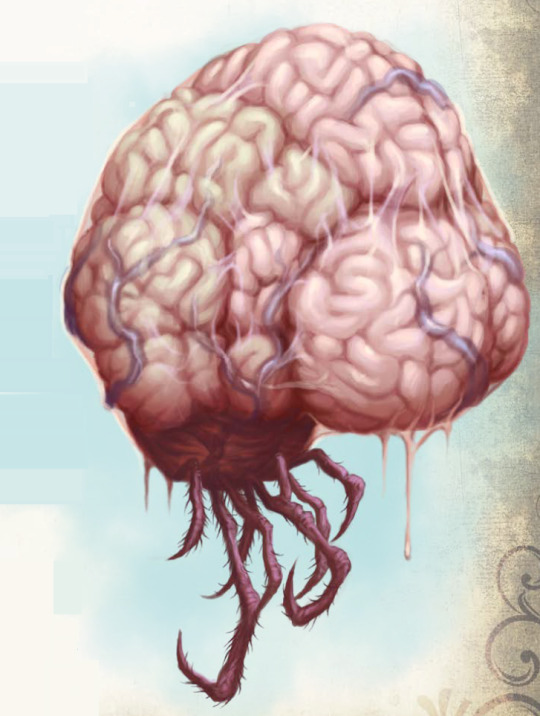
CR 6
Neutral Medium Outsider
Adventure Path: Shattered Star: the Asylum Stone, pg. 84~85
These enormous, bloated brains are the centerpiece of the Caulborn hive minds, little more than a consciousness suspended in a sea of information. Completely blind, deaf, and numb to the outer world, they rely wholly on their Caulborn brethren for care, being almost entirely unable to defend themselves and about as mobile as a slug (10ft fly speed). They, too, feed on information of all sorts, increasingly nourished the more facts and data are poured into their curdled bodies, and their unaging nature means they can gather a truly mind-boggling amount of knowledge. Any Caulborn entering a 300ft bubble around a Chrestomath immediately triggers its Racial Memory, all data in the Caulborn’s mind immediately copied and transferred to the banks within the bulbous brain for storage and perusal, prompting frequent exchanges of members between individual hives. This Racial Memory can also be shared via the hive mind of all Caulborn, who can access it to add half the Chrestomath’s Knowledge skill bonus to their own (already significantly enormous) Knowledge checks by taking a full-round action.
What kind of Knowledge does a Chrestomath offer to its mobile kin? Well, nothing particularly impressive... just, y’know, +32 to Arcane, History, Local, Planes, and Religion, and a slightly more moderate +29 to Dungeoneering, Engineering, Geography, Nature, and Nobility. This means they add +16 to a Caulborn’s A/H/L/P/R checks, and a +14 to D/E/G/Na/No, assuring they’ll more or less know anything they require. Chrestomath tend to use their titanic Knowledge bonuses for the exclusive benefit of their hive, steering their assimilated information towards assuring the short-term and long-term survival of their kind, and though they don’t possess any natural or magical precognitive abilities, the book notes that a Chrestomath’s nigh-divine intelligence and lack of distraction from outside stimulus allows them to calculate the likelihood of future events with an accuracy that may as well be precognition.
Among a Chrestomath’s other impressive abilities is the +3 deflection bonus to AC they confer to all Caulborn within 300ft of them, deflecting and dodging incoming blows with pure calculative insight and their ability to activate Cooperative Scrying with two other Caulborn present, letting them gather intelligence on any planet or plane they desire. Between their Knowledge checks and ability to scry on anything, anywhere, at any time, it’s very likely that a Caulborn hive will always know when they’re being approached with ill intent. While typically willing to at least try talking things out--and capable of doing so with its mile wide aura of telepathy--a Chrestomath with no other option can open the floodgates into an opponent’s mind, with debilitating results.
The Mind Flood of information isn’t so much damaging as it is overwhelming, pure information lacking context wielded as a literal bludgeon against the minds of whatever is presenting a danger to the hive. Any creature affected must succeed a DC 19 Will save or take 1d6 Int and Wis damage as their own memories are pushed further and further down in favor and, just as dangerously, becoming confused for 1d6 rounds and potentially becoming a danger to themselves or the party. Able to bombard targets every round with this blast of muddled memories, it should be noted that Chrestomath don’t need to be able to see or even have line-of-effect for this ability to work; the target just needs to be within 60ft and not shielded by Nondetection, Mind Blank, or similar. The brain sacks can be completely concealed by magic, artifice, or simple natural architecture as they crush an attacker’s psyche into submission.
And, of course, there’s the fact that you will likely not be fighting a Chrestomath on its own. As the grand archives of the Caulborn race, each member of a hive will gladly give their own lives to defend them. There may be anywhere from 12 to 40 of them, all ready to fight to the death. ... or use their full-rounds assimilating as much knowledge from the Chrestomath as possible before fleeing to restart elsewhere. Taking their memories to a new hive, sharing them with other Chrestomaths. All of them plotting potential revenge with their incredible intelligence.
Or, y’know, just avoiding you. Whichever path their math works out is most optimal.
You can read more about them here.
26 notes
·
View notes
Text
alright who the fuck is chrestomathic on ao3 you've ruined my life
#ive read (almost) all of your fics and#your writing style isnt even what i usually read but#here i am#with my life ruined#im shaking ive read the hendo/kane one ten times
4 notes
·
View notes
Text
Circassian Fairytales
These ten pictures are of a big size, they are printed on the canvas-like paper, which makes them look so much like paintings. Each piece of the series is the author’s personal fairytale, her allusions and impressions born in the depths of the national self-identity. Here we find chrestomathic characters (Sataney), and cultural phenomenon (ажэгъафэ – a jester in a mask of a goat), and the images inspired by the folklore and literature (abrek, horseman), and some light associations from the depths of consciousness (boy with a wheel, wood nymph, prayer to a tree). They all lack the stereotypes: the author pays much attention to the details, the retouch is moderate, the composition and the content of each picture follow strict rules. Sataney-guashe is as if unguarded and with all her perfection she is very human, clear and close. A young girl staring off into the distance symbolizes the eternal women’s waiting – waiting for love and for the loved ones, for the wind of changes, and for the destiny. The fully armed horseman is in hesitation, and he is with his horse – the only creature that will ever see him in these moments of weakness. His saber is casually hanging behind his back (although “the circassian is hung with weapons, and is proud of them, and is soothed with them”), and all his vital energy is his hand caressing his horse’s muzzle. Maria Mussova appeals to the origins the way they exist in her own imagination. This personal thing helps her create works that communicate with every spectator.

About covers and mysteries, and about pureness of thoughts
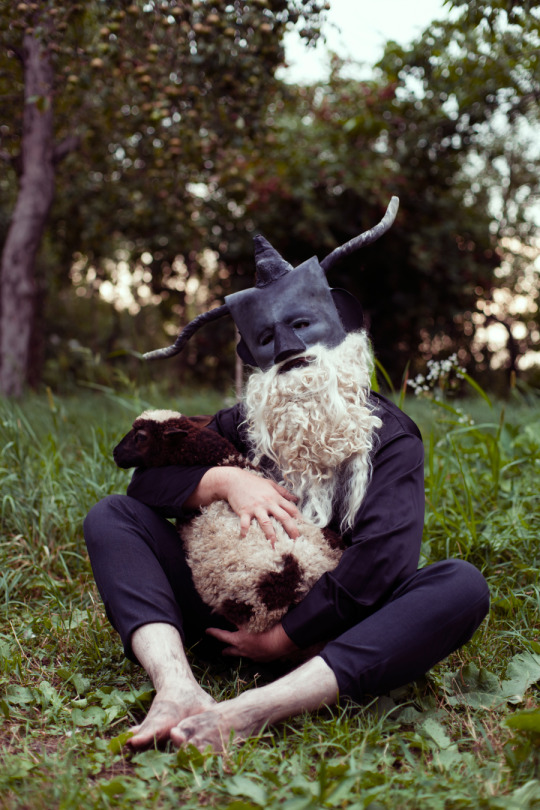
About buffoonery and sacrifice, and similarity of symbols
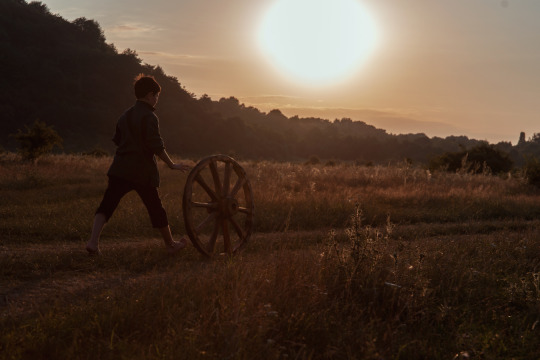
About wheel of times and childhood of humanity
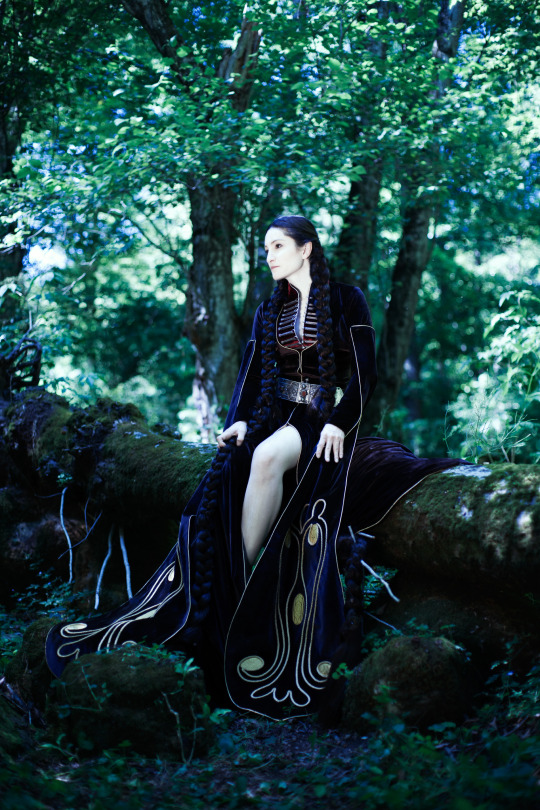
About beauty and unity with nature, and about metaphors
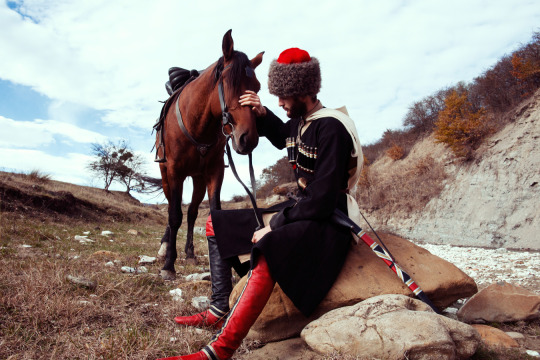
About men’s nature and emotional unity with a horse
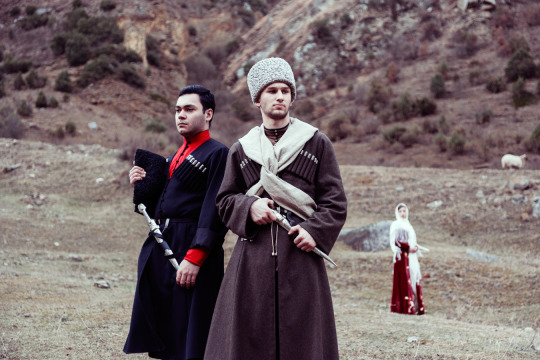
About friendship and men’s rivalry, and youth

About girls’ dreams, waiting and wind of changes

About femininity and passion, and about Sataney
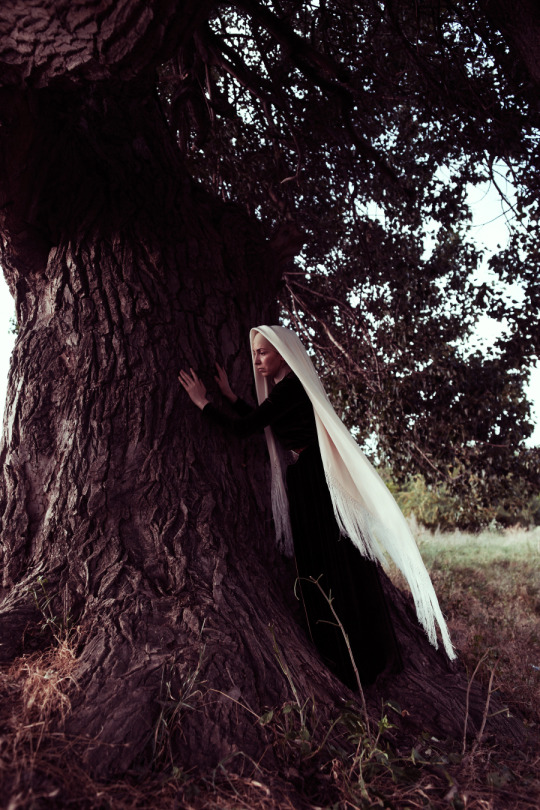
About divinity of nature and faith, and about despair

About revenge and fear, and about loneliness an abrek
9 notes
·
View notes
Text
Document 7
The king has a book.
The King's Men.
It is a thick, heavy book, green with age, and it bears the impress of numerous pages yet to be written. The surface is lined with lead, the edges of which have been worn away by the passage of time.
It has the appearance of a tome of ancient knowledge, and yet it is a tome of modern knowledge, equal parts, that the world can read now.
There is an inscription in the centre of the cover which reads:
Sed hallucina rationis sumus occurreat sed pedibus fuissent. Wider noli me imparato.
Translation: In the madness of freedom certain things occur but they are not all there yet. Better to have feared nothing and found that what you feared has been overcome.
© Sejm, 1541.
The King's Men is not a work of art. It is a book of instruction, of facts to be learned and laid before the young of both sexes. It is a form of learning which considers the way in which the mind deals with ideas, and values knowledge not for its intricacy of design or subtlety of presentation, but for its comprehensiveness of purpose. This teaching method finds the most fertile ground in the curriculum of a university.
In this context the title of the book introduces a new element. While you may find a quarto of the text in a bookstore, the king's men is a proper part of an university library. It is but a shortwork, perhaps twenty pages of hard-bound parchment filled with obscure epigrams and reflections about philosophy. The epigrams range from the most ordinary to the most extravagant of praise, and often take the form of a poem, composed in the third person. This third person style differentiates itself from the customary first person by the opaqueness of the speaker. The book is a work of profound wisdom; you will find nothing of interest in it save on the page within easy reach.
If you should, however, happen upon the cobblestoned alcove that lies at the heart of Gamber, and lie down there as the black dog does and sleep as the blind man sleeps, and the black dog-man is close at your side, and you begin to read this book to this poor weary child of six -
Into the alcove squat, slinking, nimble, vast Chrestomath.
The King's Men begins with a prologue, composed in a portion of the King's Men that has long since been lost to study. It is fragmentary, ornate, and beautiful.
These first fifty pages are, for the reader, a kind of introduction to the work. Even as a youth of puberty I had never read such care for an allegory. The child is shown within a dormitory room, and is being ferried there by two men clad in black' (this sentence is in the twentieth). Disguised as a scholar, he meets his companions, and the rest of the book is an imitation of vast, sweeping thesis to be pursued in the light of such a theme. Oh, where were we?
Let us take a second to review the history of our situation. For a single day in 1916, much of the political universe was turned upside down. The far left won the continuing Tom Mann War in much of the nation's centre: we had no official war, only a peculiar variety of general strike. Die.'s rebellion was at its height. The terrible horror brought by the Flu was still upon the country. Total war was declared two days later. There is grave irony here even as we turn to the page. Fire-bombing commenced on January 23rd: in Camberwell and Bethnal Green, indiscriminate killing of rich and poor alike which the world had not heard of for another three years.
Something of this history has remained unknown. It cost us our independence to force error upon a nation, and in its history books it is not remembered. For more than four hundred years, from William of Orange's entry in the Balfour Declaration in 1897 to the Queen's proclamation of the Falkland Islands War in 1984, every moment and every thing within several hundred miles of Coventry had been relegated into stiffly printed chapters, treating in heated technical detail overwrought long passages (if such a thing were possible) dealing with some cumbersome aspect of military doctrine or logistics or uniforms. In place of pages of printed detail, in place of pages of printed verse, in place of sets of nearly glowing illuminated initials, in place of stout juicy sections of newspaper, in place of radio drama, we have now pages of photographic reproduction. They have left us little more than the title of the work, and an indication of the type of reader it is intended for. I do not expect you to anticipate the recommendation I am about to make: We Shall Not Turn The Other Cheek .
I will not, perhaps, make this prologue into a long paragraph. It is, so to speak, my cameo in the prologue of the work: I see speech but you do not, and there is little matter in which we are more like each other than in respect of that respect in which we do not turn the other cheek: and shall we make, with the others, a catalogue of our tribute a skills manfully drafted, and recite, one by one, our speeches of tribute, our assent, our affidavits?
Men do not do this so much any longer, even in address to their fiancée. There was an emotion there that attested in its suddenness to a new purpose: a goddess had risen from the side of the pole, and with her attention she devoured the words we were receiving. The respect and awe in which we held the words had its uprush, though, its own sudden ruin. And now its early note ceased, and it threw itself once more into oblivion. Into its place would Dr. R. propose incantation after incantation of honourable and magnanimous feeling as it had been, in incident have been, in sentiment -
Honourable et dignité dignitaire
- Eternity and eternity. For Ian Osborn, the crowning act of the prologue, the effect is a kind of romantic transformation.
I. A Land in Tir Tairngire
IN Magazine of Fiction and family history
1950
It's impossible to say, I reflect, what humans would be like if they had never gone up into the sky on a meteor, if they had never been able to fly. The monkeys below us imagine that they could have scaled the valley walls from the Zoological Garden and climbed bodily harder to the higher world of men, and we horses weigh only about two hun- dred pounds and can outclimb even the spirit of our hero: for fame. Tiny and slow, insectile and imbecilic, he climbs like a dinosaur and quite tamely.
But my mind tends to last forever; and with the falsehood of the causality machine now removed from my thinking, I imagine that anyone who has climbed up on his huge winged steed and been sick to look upon the earth below would stare ruefully at the moon, seared into his retinas, if he were with me now. That there is nothing "distant," less "intimate" than stars—a meaningsrint concealed in discussions of combatant forces and planetary resources—but that if I was to offer my hand and potter's field cheek-by-jowl as a hand-and earth--and terran shell, he might
1 note
·
View note
Text
one has to wonder about the thematic and authorial sensibilities of the writer within the writer of the book within a book that is Chrestomath, first that the series is called chester chrestomath at all, a chrestomathy is a series of phrases in a foreign language meant to ease a student into learning that language. which i imagine is a reference to the reader learning magic, the mantic language as it were, of the world.
second, he decided to call the beloved headmaster of the magic school lucifer which is a bold writing desition, and then he went and named his lovely wife lilith. and these, from all i could gather, are meant to be extremely sympathetic characters in the book within a book (is a bit more complicated wether they are the good guys in almost nowhere proper but that is for another day)
like, thats fascinating, that a writer chose to have the lovely mentor in a children’s book be called lucifer. in universe i figure that must have stoked so much controversy, calls for censorship, banning. what was he trying to say with this? or was it just a cheeky little joke from the author, which is in turn a cheekier smaller joke from rob himself?
such a tiny, small, inconsequential detail and yet so fascinating
1 note
·
View note